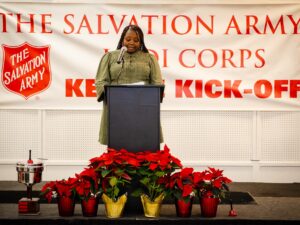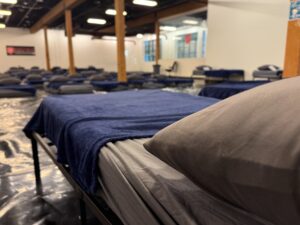The Salvation Army mobilizes to bring aid to Haiti.
Haiti is part of the Caribbean Territory, with headquarters in Kingston, Jamaica. Territorial Commander Colonel Onal Castor—a Haitian himself—is preparing to go to the country as quickly as possible.
The quake—the worst to strike the Caribbean in 200 years—disintegrated Haiti’s capital, Port-au-Prince, including some Salvation Army properties. Present in Haiti since 1950, the Army currently operates schools, clinics, a hospital, feeding programs, children’s homes and church-related activities spread across two major facilities in Port-au-Prince—close to the epicenter of the earthquake—and elsewhere in the country.
One of the compounds includes a home for 52 children; a school with a daily attendance of 1,500 children; a medical clinic caring for 150-200 people daily; and a church that on any typical Sunday welcomes nearly 1,000 people. The facility, less than 10 minutes from the National Palace, is in a poor area of the nation’s capital.
According to reports from Salvation Army staff in Port au Prince, no one in the compound was injured during the earthquake, but the children’s home, the clinic and church suffered major damage. Several smaller buildings, including residences, have collapsed completely. People were sleeping in the parking lot overnight, while severe aftershocks continued to affect the country.
The second compound, which houses Salvation Army administrative offices, is being used as an emergency operations center; damage here was slight.
The Salvation Army hospital in Fond-des-Negres (75 miles west of Port-au-Prince) reports some minor damage, but no injuries.
The Salvation Army has committed more than $850,000 to support relief efforts in Haiti. Its World Services Office (SAWSO), based in Alexandria, VA is preparing to send more than 44,000 lbs of pre-packaged emergency rations to the country, along with emergency disaster teams. The Salvation Army is working with other agencies to identify appropriate transportation for the food. As with all such relief efforts, The Salvation Army will be a part of the initial emergency response while assessing longer term needs of the residents.
“Our thoughts and prayers are with the people of Haiti at this time and especially our Salvation Army officers and employees throughout the country,” said Lt. Col. Dan Starrett, SAWSO director.
As recently as November 2009 General Shaw Clifton and Commissioner Helen Clifton were in Haiti, visiting some of the places that are now badly damaged by the quake. The General has called the worldwide Salvation Army to prayer for the people of Haiti whose lives have been so tragically affected by the earthquake, and for the many people who will be seeking to offer help and support.
You can help
The Salvation Army is accepting monetary donations via www.salvationarmyusa.org, 1-800-SAL-ARMY and postal mail at: The Salvation Army World Service Office, International Disaster Relief Fund, PO Box 630728, Baltimore, MD 21263-0728. Designate donations “Haiti Earthquake.” As of Thursday morning, The Salvation Army had raised more than $762,000 in online donations and through 1800-SAL-ARMY. For continued updates, please visit www.blog.salvationarmyusa.org.
If you have special skills that would help the relief effort, please consider volunteering for a designated period of time in Haiti. Contact your divisional headquarters if you meet these criteria:
– Critical Incident Stress Management (CISM) Training (advanced preferred)
– Emotional & Spiritual Care (ESC) Training
– Incident Command (ICS) Training & Experience working in the Incident Command structure
– Previous volunteer deployment experience (preferred)
– Fluent in French (preferred but not required)
– Medical Training (i.e. registered nurse) – (preferred but not required).
Compiled by Karen Gleason from various Salvation Army











